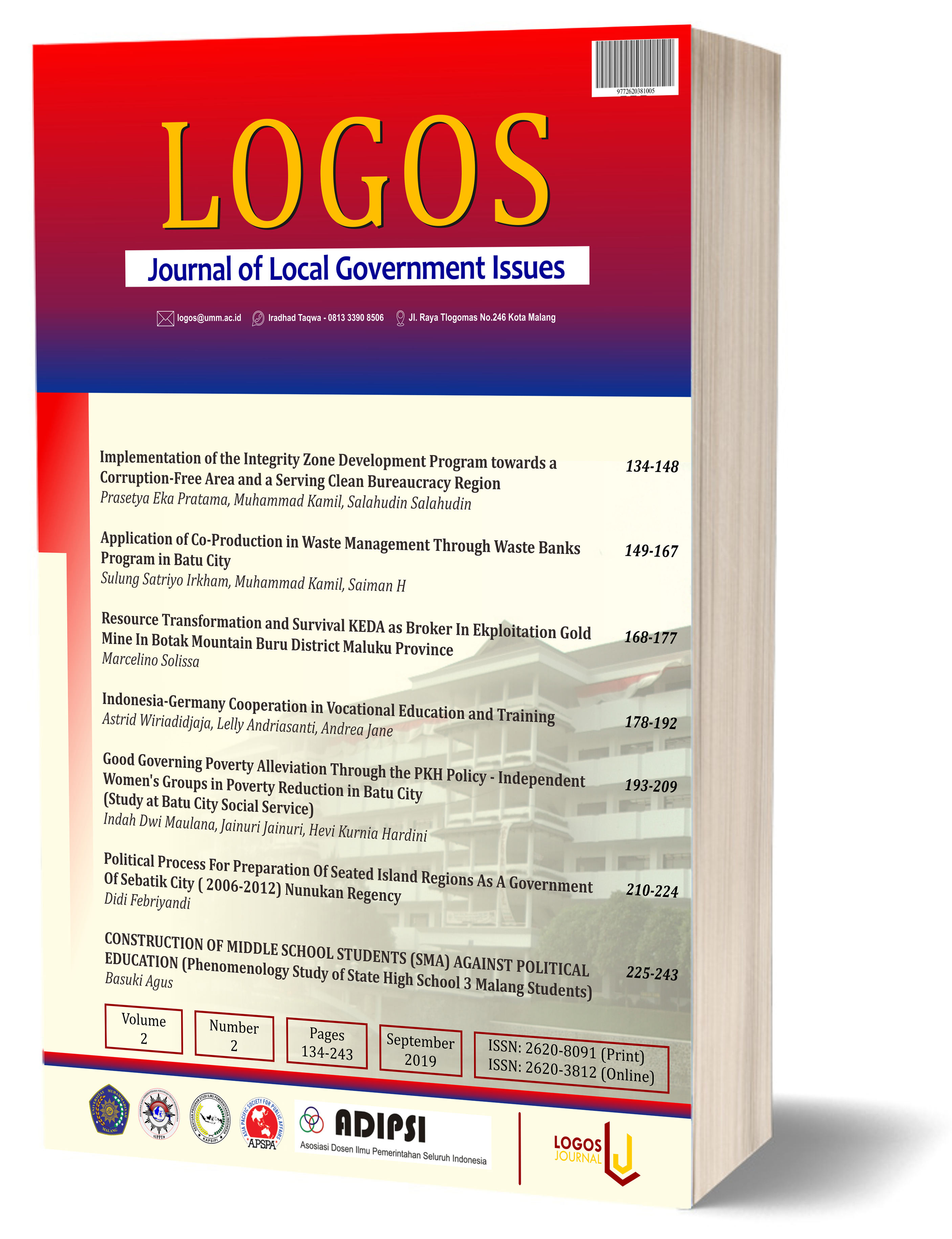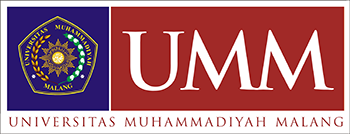Implementation of the Integrity Zone Development Program towards a Corruption-Free Area and a Serving Clean Bureaucracy Region
DOI:
https://doi.org/10.22219/logos.Vol2.No2.134-148Abstract
Government bureaucracy is an institution responsible for carrying out the functions of public services, community empowerment to the development of a country, so its presence is very crucial in supporting the state administration system. In reality, government bureaucracy has quite complicated issues, namely the widespread acts of corruption and public services that have not been maximized. Therefore, the Central Government's attempts to address current issues through Ministry of Empowerment of State Apparatus and Bureaucracy Reform to resolve existing problems are implementing an integrity zone development program, both at the central and regional levels. The program aims to create a corruption-free government bureaucracy and enhance the quality of public services. The research method used is descriptive qualitative. Methods for collecting data are through observation, interviews, and documentation. The theory used in this study is the Edwards III model's policy implementation theory, which consists of communication factors, implementing factors, human resource factors, and bureaucratic structure factors. The results of the study found that the Program had been implemented in the Malang Regional Tax Service Agency. The obstacles encountered are in the bureaucratic culture, human resources and public service systems that apply. The researchers' suggestion is that there must be further innovation and periodic supervision of agencies so that the implementation of the program has good results in implementing of bureaucratic reform, especially in Malang City.
Downloads
References
Ahmad, R. (2008). "Governance, Social Accountability and The Civil Society." JOAAG 3(1): 10-21
Caesaringi, I., et al. (2017). "Reformasi Birokrasi Kota Tegal (Studi Kasus Zona Integritas Bebas Korupsi dan Birokrasi Bersih BP2T dan RSUD Kardinah)." Journal of Politic and Government Studies 6(03): 541-550.
George, E. I. (1980). "Implementing Public Policy." Wangshington, DC Robert L Peabody.
Nurbarani, M. (2009). Reformasi Birokrasi Pemerintah Kota Surakarta, UNIVERSITAS DIPONEGORO.
Rahmawati, D. E. (2017). " Evaluasi Integritas Pelayanasn Public Menuju Wilayah Bebas Korupsi dan Wilayah Birokrasi Bersih Melayani di PTSP Kota Metro." Universitas Lampung.
Tahir, A. (2014). "Kebijakan Publik dan Transparansi Penyelenggaraan Pemerintahan Daerah." PATEN 8(89).
Dokumen Kerangka acuan Kerja Pembangunan Zona Integritas Kota Malang Tahun 2018
Kementerian Pendayagunaan Aparatur Negara dan Reformasi Birokrasi, 2015, Himpunan Peraturan Bidang Reformasi Birokrasi, Akuntabilitas Kinerja dan Pengawasan Tahun 2014-2015, Deputi Bidang Reformasi Birokrasi, Akuntabilitas Kinerja dan Pengawasan, Jakarta
Kementerian Pendayagunaan Aparatur Negara dan Reformasi Birokrasi, 2015, Rencana Strategis Kementerian Pendayagunaan Aparatur Negara dan Reformasi Birokrasi Tahun 2015-2019, Deputi Bidang Reformasi Birokrasi, Akuntabilitas Kinerja dan Pengawasan, Jakarta
Kementerian Pendayagunaan Aparatur Negara dan Reformasi Birokrasi, 2015, Road Map Reformasi Birokrasi 2015-2019, Deputi Bidang Reformasi Birokrasi, Akuntabilitas Kinerja dan Pengawasan, Jakarta
Peraturan Menteri Pendayagunaan Aparatur Negara dan Reformasi Birokrasi Republik Indonesia Nomor 11 Tahun 2015 Tentang Road Map Reformasi Birokrasi 2015-2019
Peraturan Menteri Pendayagunaan Aparatur Negara dan Reformasi Birokrasi Republik Indonesia Nomor 52 Tahun 2014 Tentang Pedoman Pembangunan Zona Integritas Menuju Wilayah Bebas dari Korupsi dan Wilayah Birokrasi Bersih Melayani di Lingkungan Instansi Pemerintah
Peraturan Walikota Malang Nomor 20 Tahun 2015 Tentang Road Map Reformasi Birokrasi Pemerintah Kota Malang Tahun 2015-2019
Undang-undang Republik Indonesia Nomor 31 Tahun 1999 Tentang Pemberantasan Tindak Pidana Korupsi
Undang-undang Republik Indonesia Nomor 25 Tahun 2009 Tentang Pelayanan Publik
Downloads
Published
How to Cite
Issue
Section
License
Copyright (c) 2019 Prasetya Eka Pratama, Muhammad Kamil, Salahudin Salahudin

This work is licensed under a Creative Commons Attribution-ShareAlike 4.0 International License.
Authors who publish with this journal agree to the following terms:
- Authors retain copyright and grant the journal right of first publication with the work simultaneously licensed under a Creative Commons Attribution-ShareAlike 4.0 International License. that allows others to share the work with an acknowledgment of the work's authorship and initial publication in this journal.
- Authors are able to enter into separate, additional contractual arrangements for the non-exclusive distribution of the journal's published version of the work (e.g., post it to an institutional repository or publish it in a book), with an acknowledgment of its initial publication in this journal.
- Authors are permitted and encouraged to post their work online (e.g., in institutional repositories or on their website) prior to and during the submission process, as it can lead to productive exchanges, as well as earlier and greater citation of published work (See The Effect of Open Access).

This work is licensed under a Creative Commons Attribution-ShareAlike 4.0 International License.













